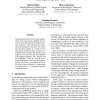Free Online Productivity Tools
i2Speak
i2Symbol
i2OCR
iTex2Img
iWeb2Print
iWeb2Shot
i2Type
iPdf2Split
iPdf2Merge
i2Bopomofo
i2Arabic
i2Style
i2Image
i2PDF
iLatex2Rtf
Sci2ools
106
click to vote
EMNLP
2010
2010
An Efficient Algorithm for Unsupervised Word Segmentation with Branching Entropy and MDL
This paper proposes a fast and simple unsupervised word segmentation algorithm that utilizes the local predictability of adjacent character sequences, while searching for a leasteffort representation of the data. The model uses branching entropy as a means of constraining the hypothesis space, in order to efficiently obtain a solution that minimizes the length of a two-part MDL code. An evaluation with corpora in Japanese, Thai, English, and the "CHILDES" corpus for research in language development reveals that the algorithm achieves an accuracy, comparable to that of the state-of-the-art methods in unsupervised word segmentation, in a significantly reduced computational time.
Adjacent Character Sequences | EMNLP 2010 | Natural Language Processing | Unsupervised Word Segmentation | Word Segmentation Algorithm |
| Added | 11 Feb 2011 |
| Updated | 11 Feb 2011 |
| Type | Journal |
| Year | 2010 |
| Where | EMNLP |
| Authors | Valentin Zhikov, Hiroya Takamura, Manabu Okumura |
Comments (0)

